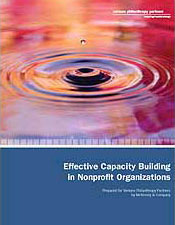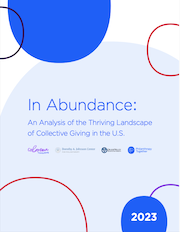Site Search
- resource provided by the Forum Network Knowledgebase.
Search Tip: Search with " " to find exact matches.
To dig deeper into causes of, and responses to, structural racism within philanthropy in New Jersey, the Council of New Jersey Grantmakers established a Racial Equity Task Force made up of leaders at CNJG member organizations.
The task force’s mandate is to develop goals and objectives to create a roadmap for action to eliminate the structural racism that for too long has denied opportunity.
“This is a defining time in the history of our state and our nation,” said Maria Vizcarrondo, president and CEO of CNJG. “We are at a crossroads where we have to expose truth and take action for racial equity. Every institution and organization needs to look inward and discover whether it might be contributing to racism, even unknowingly. Our task force will be a forum for thought and a vehicle for action as we figure out how best to leave the middle ground and do the hard work to support systemic change. Philanthropy must invest resources towards advocacy to affect policy, and take that big leap away.”
Annette Strickland, executive director of the Schumann Fund for New Jersey and a CNJG Board member, will chair the task force. “The current health and racial crisis has brought into focus the impacts of structural racism on American society, she said. “Now is the time for us to explicitly examine the role that we as individuals and philanthropy as a professional practice contribute to those structures. To quote Martin Luther King, ‘Philanthropy is commendable, but it must not cause the philanthropist to overlook the circumstances of economic injustice which make philanthropy necessary.’”
Joining her on the task force are: Craig Drinkard, deputy director of the Victoria Foundation, CNJG Board member; Jeffrey Vega, president and CEO, Princeton Area Community Foundation and CNJG Board member; Jeremy Grunin, president, the Grunin Foundation and CNJG Board member; Kiki Jamieson, president, The Fund for New Jersey and former CNJG Board member; Melissa Litwin, program director, The Henry and Marilyn Taub Foundation, CNJG Board member; and Sharnita Johnson arts program director, Geraldine R. Dodge Foundation.
The Council of New Jersey Grantmakers is a nonprofit organization that exists to strengthen and promote effective philanthropy throughout the state. It supports independent, corporate, family and community foundations, as well as public grantmakers, in addressing society’s most difficult problems and providing leadership on statewide issues. About 2,300 grantmaking entities make up New Jersey’s philanthropic sector. They award more than $42 billion in grants annually.
###
In 2003, with member support, CNJG commissioned a report on the impact a potential conversion of Horizon Blue Cross Blue Shield to a for-profit might have on access to health care in New Jersey. Research from the Center for State Health Policy (CSHP) at Rutgers University, provided details about the law governing such conversions in New Jersey and the experience of other states with conversions. The report identified questions raised in other states when such conversions occur, especially about the valuation of assets, the impact on low-income families, and the operation of the philanthropic foundations that have been established as stewards of the assets generated by the conversions. CNJG’s purpose was to seek answers to critical questions relevant to the availability of healthcare coverage for New Jersey’s citizens and to discuss models of best practice for healthcare conversion foundations across the United States.
A report on perceptions of why Black professionals leave the field of philanthropy.

This report clarifies and broadens the definition of capacity building. The findings of this report represent a collective body of information that will be useful to the social, public, and private sectors.

The Funders Collaborative was an innovative partnership supported by 14 local and national foundations. The collaborative supplemented the programs and grantmaking of its member foundations by working with community organizations, the business sector and public agencies to encourage collaboration, planning and investment “beyond the rail.”
The Green Line opened in June 2014, and the Funders Collaborative concluded its work two years later in June 2016 as planned.
The Funders Collaborative was founded with a belief in light rail’s potential for benefiting the people and places closest to the line. The collaborative envisioned stable, thriving neighborhoods throughout the corridor that reflect community identities and link all people to regional opportunities and local amenities.
The Funders Collaborative concluded its work in June 2016 as planned. The final report and archives document the accomplishments and learnings of this innovative partnership have been archieved for learning purposes.

